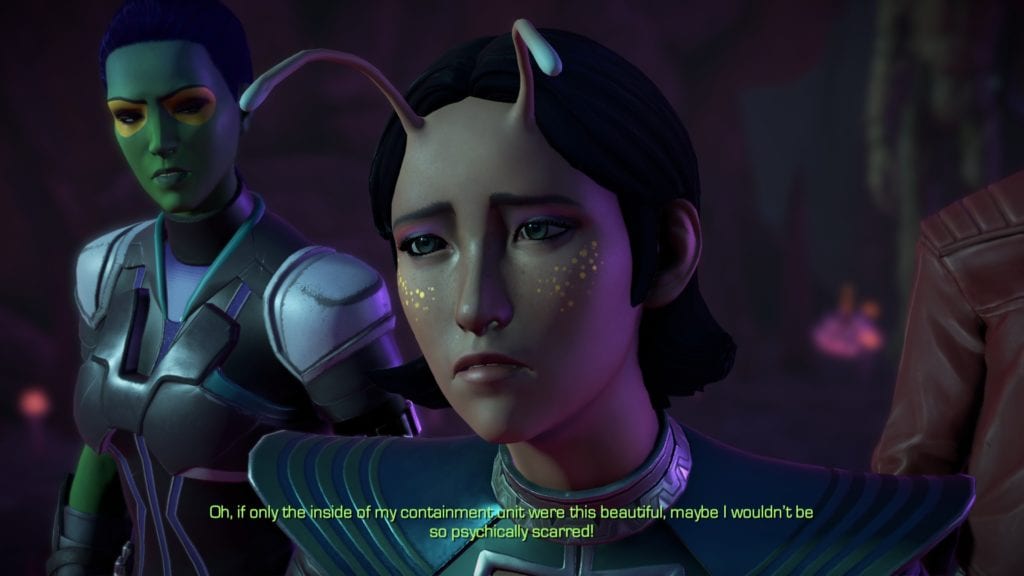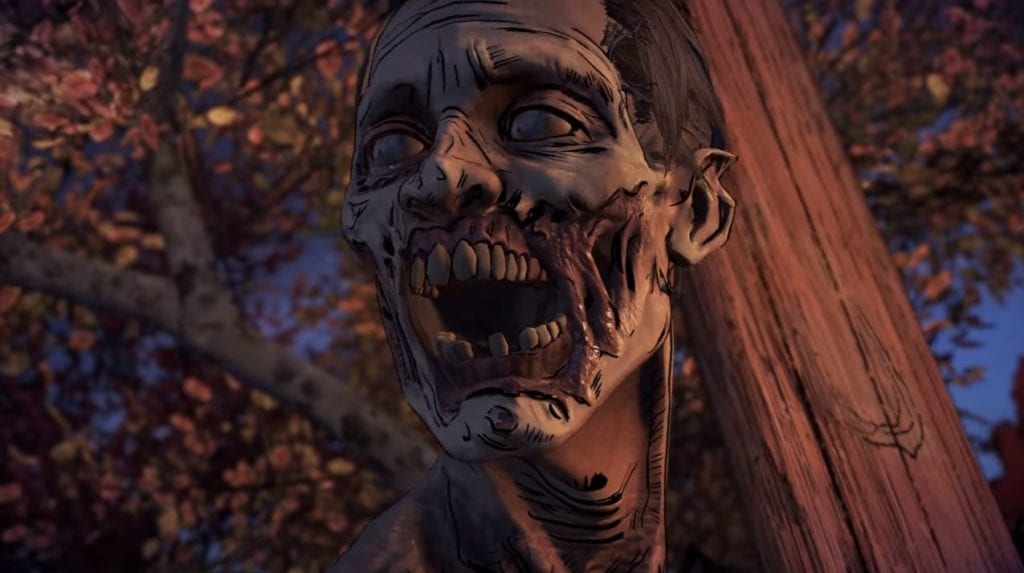Last Friday, the gaming industry was hit with one of the biggest shocks in recent years. After previous cutback and a slow decline, it was announced that Telltale Games, developers of licensed storytelling adventure games like The Walking Dead or Tales From The Borderlands, would be closing up shop, laying off 95% of its employees, and canceling almost every game currently in development. To say that the gaming world was rocked by this news would be a bit of an understatement:
Just heard about Telltale shutting down. That’s… wow.
— Commander Stephanie Sterling (@JimSterling) September 21, 2018
I'm so sad about Telltale shutting down. Such great storytelling and gameplay. Really astonished. <3
— Felicia Day?? (@feliciaday) September 21, 2018
Sad to see Telltale dissolving. Those are some great folks who told some brilliant stories. Best of luck to all the devs with finding new jobs.
— Gav (Miracle Of Sound) (@miracleofsound) September 22, 2018
The news comes a few months after a scathing article from The Verge which detailed the toxicity of Telltale’s workplace culture. It painted a picture of an indie studio that grew past its means as it added project after project to an overworked and underpaid staff. Telltale relied heavily on the twin evils of the modern games industry: churn and crunch. Not only would they hire a block of devs for each new game, but they’d also keep those workers on the job for up to 20 hours a day and making them work for over 100 hours a week. Then, their value sufficiently wrung out by the company, they were fired to cut costs and make room for the newer, cheaper block of devs.
“The system for creating games is broken, and it will result in the collapse of many other beloved studios in the future.”
The expansion of the company post The Walking Dead to a workforce of over 300 did not come with the requisite changes in management. Telltale had become a mid-level player in the industry with millions of dollars in licensing to handle, but the developers still thought of it as the small and scrappy indie studio it used to be. Communication broke down, personnel moved from project to project seemingly on a whim, and major creative minds in the company like Jake Rodkin and Sean Vanaman (lead developers on The Walking Dead) began to emigrate en masse. And even as workers began to buckle under the stress of juggling up to nine different games, there was no escape from the crunch.

Even as they struggled with below standard wages and the Bay Area’s cost of living (some even high-level developers were living paycheck to paycheck), there was little respite thanks to Telltale’s culture. Telltale’s unlimited vacation days policy often went unused as workers didn’t want to be scapegoated for more crunch, and managers tried to ply their overworked staff with food and booze. By the end, even the true believers, the core of any tech company and usually the most exploited, were beginning to question things.
Telltale relied on the “it’s a privilege to work here” mentality so people put up with
– lower wages
– toxic leadership
– unreasonable deadlinesSince everyone was passionate about their work, they looked the other way.
Now 200+ devs are unemployed.
Unionize @GameWorkers
— ?? juancow ?? (@juancow) September 22, 2018
They continued to hemorrhage talented personnel like LucasArts vets Mike Stemmle (Sam & Max, Back to the Future The Game) and Chuck Jordan (Sam & Max, Strongbad’s Cool Games for Attractive People), as well as almost all of the devs who worked on their biggest successes post-The Walking Dead, Tales From the Borderlands and The Wolf Among Us. But even as their talent pool shrank, one thing didn’t change: Kevin Bruner, programmer, Telltale co-founder and, in 2015, the new CEO.
“So often the developers are blamed for the failings of a game and so much of what goes wrong should be on the company’s head instead.”
Many developers pinned the problems within Telltale on Bruner, who’s ego allegedly led to many of the personnel changes that led to the company’s brain drain. While Bruner disputes the accusations and even sued Telltale after he stepped down from the CEO position in 2017 alleging financial damage, his two-year tenure at the top corresponded with an overall decline in sales as well as market share. In the eyes of some, Telltale was still rehashing The Walking Dead while up and comers like Dontnod and SuperMassive innovated the genre with Life Is Strange and Until Dawn.

The studio’s last hope came last year, when a new CEO Pete Hawley took over, fired 25% of the company and, finally, seemed to have righted the ship again. Set to release a new season of their biggest hit, now with a teenage Clementine in the lead role, as well a sequel to the critical darling The Wolf Among Us and a seemingly tailor-made for Telltale adaptation of Stranger Things, Telltale had a real shot at getting back into the game in a big way.
Then the message went out.
— Telltale Games (@telltalegames) September 21, 2018
There was no warning from the company. Not even the workers knew until that very day. Unlike the earlier cuts, where the laid-off devs got to say goodbye and the whole staff got the day off to send them off at a local bar, it was cold and it was efficient. Nobody would get severance past a week, nobody would get health insurance. Some workers had been there less than a week, some having left lucrative jobs elsewhere to join Telltale. Many had families, and one dev even had relocated cross country for the job. And whereas the previous layoffs came with a job fair and severance through the end of the year, the newly jobless workers were left to face a cutthroat job market barely a week of health insurance and no severance pay whatsoever. Only a skeleton crew of about 25 was left behind to finish up Minecraft: Story Mode for Netflix.
Re: I got laid off at Telltale
None of my sleepless nights or long hours on weekends trying to ship a game on time got me severance today. Don’t work overtime unless you’re paid for it, y’all. Protect your health. Companies don’t care about you.
— Brandon Cebenka (@Binkysaur) September 21, 2018
Telltale Games was dead and the workers who had produced their games were now staring down the barrel of unemployment. Already underpaid while at Telltale, they now had to deal with paying rents and mortgages on the second most expensive housing market in the country. The stories from the over 250 people laid off came out first as a trickle and then a deluge. A Twitter thread from TWD: The Final Season, Guardians of the Galaxy, and Batman: Enemy Within writer and lead designer Emily Grace Buck went viral as over 6,000 people retweeted it. Fans tried to make sense of thing and now jobless employees were forced the bear the brunt of the fallout as beloved franchises were canceled. It even came out later that they wouldn’t even finish The Walking Dead: The Final Season past episode two despite earlier assurances that it would happen.
“Learn to see the difference between the companies and the workers who make the games…Direct your anger at the executives grinding our medium into the ground for profit.”
The response of the games industry was swift, however, and the #telltalejobs trending within a day. Tech and game companies large and small reached out to the ex-Telltale employees. While some of the offers were a little farfetched (a move to Montreal or Montpellier to work for Ubisoft was probably out of the question for many of them) and often promised “interviews” rather than work, the workers were hopefully positioned to get on their feet in some way. But the problems were not going to go away.
While the salaries at Telltale were below average, the industry standard pay is not much better across the board. And even if a newly employed Telltale veteran found themselves with a raise, there’s a very good chance they’d face the same churn and burn, 80 hour a week crunch that had helped kill their old company. For many people, this was a wake-up call. Luckily, things don’t have to be this way.
https://twitter.com/twoscooters/status/1043365737128239104
As detailed a couple weeks ago, Game Workers Unite is fighting to help change the toxic culture within the games industry through class solidarity, labor organization, and unionization of the workers. They were quickly inundated with questions in the aftermath and soon put out a statement on the situation. They put the lesson of Telltale in stark relief:
“This problem is not isolated to only Telltale or the executives there – this is a problem that we see time and time again throughout the industry, and we will continue to see as long as management is able to take advantage of workers. Just within the past month, we’ve seen three major studio closures. The system for creating games is broken, and it will result in the collapse of many other beloved studios in the future.”
I again spoke with Emma Kinema from GWU amidst the still ongoing shockwaves of Telltale’s closure. The loss of Telltale was a professional shock for many at GWU, but also a personal one. The games industry is still a relatively tightly knit group and many had friends among those let go on Friday.
Dan Arndt: Do you think this sort of event might happen more frequently in the coming years?
Emma Kinema: It already is happening frequently. This month alone has seen the shuttering of three well-respected studios.
DA: Is this sort of thing inevitable?
EK: Not necessarily. Unions shouldn’t be seen as a cure-all for things like studio closures and failed launches. But being unionized can help curb the excesses of malicious management. Being unionized can ensure severance for employees, healthcare that lasts beyond one job, and so many more material benefits.
DA: Is there anything a consumer, especially a fan of Telltale, could do that might help prevent this from happening again
EK: The number one thing players can do is to learn the difference between the companies and the workers who make the games they love. So often the developers are blamed for the failings of a game and so much of what goes wrong should be on the company’s head instead. We love our games dearly and we also hate seeing executives run them into the ground. The other thing that can be a great help is in the future, when we have public-facing unionization campaigns, strikes, or boycotts, players can stand with us in solidarity. We have a lot in common with our players. We both deeply care about our games, and our medium and our industry will improve drastically if we can establish standards for better working conditions through unionization.
The fate of Telltale is not inevitable, but change will be needed to keep it from being so. Don’t tweet at the ex-employees about the fate of your favorite games, and don’t ask how they would have ended. Don’t pester them for advice, don’t tell them what they should have done or should do. Support the work at GWU by joining your local chapter and support worker-owned studios like Pixel Pushers 512 or Motion Twin. Be a smart consumer and read up on the conditions your next favorite game was produced under. Stand with your fellow workers in solidarity to create a stronger and more equitable industry, or stand alone and watch it crumble before your eyes.
Thanks to Emma Kinema for her statements on the situation and the former employees of Telltale for their honesty. All images via Telltale Games.

